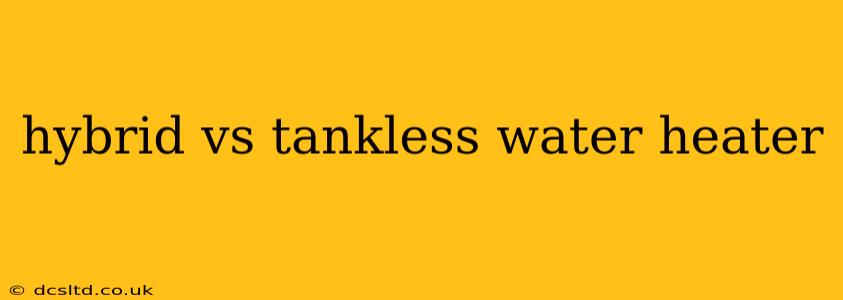Choosing the right water heater can be a daunting task. With so many options available, understanding the differences between various types is crucial for making an informed decision. This article compares two popular choices: hybrid (heat pump) water heaters and tankless water heaters, highlighting their pros and cons to help you determine which best suits your needs and budget.
What is a Hybrid (Heat Pump) Water Heater?
Hybrid water heaters, also known as heat pump water heaters, are energy-efficient alternatives to traditional tank water heaters. They work by extracting heat from the surrounding air and transferring it to the water in the tank. This process significantly reduces energy consumption compared to electric or gas tank water heaters. They still utilize a tank to store heated water, offering a consistent supply.
What is a Tankless Water Heater?
Tankless water heaters, also known as on-demand water heaters, heat water directly without the need for a storage tank. When you turn on a hot water tap, the unit heats the water as it flows through, providing an endless supply of hot water. Tankless heaters are available in gas and electric models.
Hybrid vs. Tankless: A Detailed Comparison
Let's delve into a more detailed comparison, addressing common questions and concerns:
What are the pros and cons of a hybrid water heater?
Pros:
- High Energy Efficiency: Hybrid water heaters are significantly more energy-efficient than traditional tank water heaters, leading to lower energy bills.
- Consistent Hot Water Supply: The tank ensures a readily available supply of hot water.
- Longer Lifespan: They generally have a longer lifespan than traditional tank water heaters.
- Environmentally Friendly: Their high energy efficiency contributes to a smaller carbon footprint.
Cons:
- Higher Initial Cost: The upfront cost of a hybrid water heater is typically higher than a standard tank water heater.
- Space Requirements: They require more space than traditional tank water heaters.
- Performance in Cold Climates: Their efficiency can be reduced in extremely cold climates as they struggle to extract heat from cold air.
- Potential for Freezing: In very cold climates, proper insulation and protection from freezing temperatures are crucial.
What are the pros and cons of a tankless water heater?
Pros:
- Endless Hot Water: Tankless heaters provide a seemingly endless supply of hot water, eliminating the risk of running out.
- Space Saving: They are smaller and take up less space than tank water heaters.
- Longer Lifespan: With proper maintenance, tankless water heaters can last for many years.
- Increased Water Pressure: You won't experience the pressure drop associated with large tank heaters.
Cons:
- Higher Initial Cost: The upfront cost is often higher than a standard tank water heater.
- Higher Energy Consumption (with multiple simultaneous uses): While efficient for single uses, they can consume more energy when multiple hot water sources are used simultaneously.
- Potential for Scalding: The water can get extremely hot, requiring careful temperature regulation to avoid scalding.
- Requires Strong Plumbing System: A tankless water heater requires a strong plumbing system to handle the higher water pressure and flow.
Which is more energy efficient: hybrid or tankless?
Generally, hybrid water heaters tend to be more energy-efficient than tankless water heaters, especially in situations with consistent hot water demand. Tankless systems can become less efficient when multiple hot water fixtures are used simultaneously. However, both options offer significant energy savings compared to traditional electric storage tank water heaters.
Which is better for a large family?
For a large family with high hot water demands, a hybrid water heater with a larger tank capacity might be a better option to ensure consistent hot water supply. Tankless water heaters might struggle to keep up with the demand of multiple showers or appliances running concurrently.
Which is better for a small apartment?
For a small apartment with limited space and moderate hot water demand, a tankless water heater might be a suitable choice due to its compact size and endless hot water supply.
How much does a hybrid water heater cost?
The cost of a hybrid water heater varies depending on the size, features, and brand. Expect to pay significantly more than for a standard electric water heater, but less than some tankless models.
How much does a tankless water heater cost?
Similar to hybrid models, the cost of a tankless water heater varies greatly depending on size, fuel type, and features. Typically, tankless water heaters are at the higher end of the price spectrum.
Ultimately, the best choice between a hybrid and a tankless water heater depends on your individual needs, budget, climate, and hot water usage patterns. Carefully consider your lifestyle, household size, and long-term energy costs to make an informed decision that best serves your home and family.
